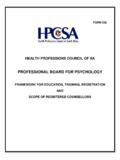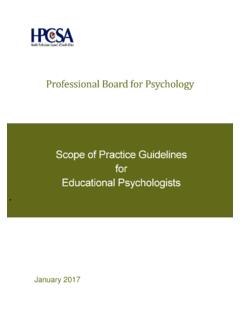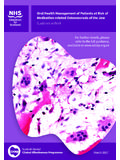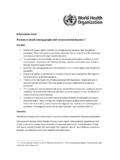Transcription of THE HEALTH PROFESSIONS COUNCIL OF SOUTH AFRICA …
1 THE HEALTH PROFESSIONS COUNCIL OF SOUTH AFRICA GUIDELINES FOR GOOD PRACTICE IN THE healthcare PROFESSIONS seeking patients INFORMED consent : THE ETHICAL CONSIDERATIONS BOOKLET 4 PRETORIA SEPTEMBER 2016 HEALTH PROFESSIONS COUNCIL of SOUTH AFRICA Post Office Box 205 Pretoria 0001 Telephone: (012) 338 9300 Fax: (012) 328 4863 E-mail: Website: THE SPIRIT OF PROFESSIONAL GUIDELINES Practising as a healthcare professional is based upon a relationship of mutual trust between patients and healthcare practitioners. The term profession means a dedication, promise or commitment publicly made .1 To be a good healthcare practitioner, requires a life-long commitment to sound professional and ethical practices and an overriding dedication to the interests of one s fellow human beings and society. In essence, practising as a healthcare professional is a moral enterprise.
2 In this spirit, the HPCSA presents the following ethical guidelines to guide and direct the practice of healthcare practitioners. These guidelines form an integral part of the standards of professional conduct against which a complaint of professional misconduct will be evaluated. [Note: The term healthcare practitioner in these guidelines refers to persons registered with the HPCSA]. Pellegrino, ED. Medical professionalism: Can it, should it survive? J Am Board Fam Pract 2000; 13(2):147-149 (quotation on p. 148). 2 2 TABLE OF CONTENTS 1. GUIDANCE TO healthcare PRACTITIONERS .. 3 2. INTRODUCTION .. 3 3. consent TO INVESTIGATION AND TREATMENT .. 3 PROVIDING SUFFICIENT INFORMATION .. 3 RESPONDING TO QUESTIONS .. 5 WITHHOLDING INFORMATION .. 6 PRESENTING INFORMATION TO patients .. 6 4. WHO OBTAINS consent ? .. 7 5. THE RIGHT OF patients TO INFORMATION .. 7 6. ENSURING VOLUNTARY DECISION MAKING.
3 8 7 EMERGENCIES .. 8 8 ESTABLISHING CAPACITY TO MAKE DECISIONS .. 8 ASSESSING MENTAL CAPACITY .. 8 FLUCTUATING CAPACITY .. 9 MENTALLY INCAPACITATED patients .. 9 THIRD PARTY NOMINATIONS IN REGARD TO consent .. 9 10 9. THE BEST INTERESTS PRINCIPLE .. 11 10. APPLYING TO THE COURT .. 12 11. FORMS OF consent .. 12 12. EXPRESS consent .. 12 13. STATUTORY REQUIREMENTS .. 13 14. IMPLIED consent .. 13 15. REVIEWING consent .. 13 16. consent TO SCREENING AND TESTING .. 13 18. ICD10 CODING AND INFORMED consent .. 14 PROVIDER RESPONSIBILITIES: ICD-10 .. 14 INFORMED consent FOR INTER- COUNCIL INTERACTION OF HEALTH PROFESSIONALS AS MEMBERS OF A healthcare TEAM .. 15 3 3 SEEKINGPATIENTS INFORMEDCONSENT: THEETHICAL CONSIDERATIONS 1. GUIDANCE TO healthcare PRACTITIONERS Being registered under the HEALTH PROFESSIONS Act, 1976 (Act No. 56 of 1974), gives healthcare practitioners certain rights and privileges. In return, you must meet the standards of competence, care and conduct set by the HEALTH PROFESSIONS COUNCIL of SOUTH AFRICA .
4 This booklet sets out the principles of good practice which all healthcare practitioners are expected to follow when seeking patients ' informed consent to investigations, treatment, screening or research. 2. INTRODUCTION Successful relationships between healthcare practitioners and patients depend upon mutual trust. To establish that trust practitioners must respect patients ' autonomy - their right to decide whether to undergo any medical intervention, even where a refusal may result in harm to themselves or in their own death. patients must be given sufficient information in a way that they can understand, to enable them to exercise their right to make informed decisions about their care. This is what is meant by an informed consent The right to an informed consent flows from the SOUTH African Constitution, the National HEALTH Act, various other statutes, the common law and the HPCSA Guidelines.
5 HEALTH care practitioners are expected to be aware of the law in this regard. The law prescribes the minimum requirements when seeking informed consent from patients . Effective communication is the key to enabling patients to make informed decisions. healthcare practitioners must take appropriate steps to find out what patients want to know and ought to know about their condition and its treatment. Such dialogue with patients leads to clarity of objectives and understanding, and strengthens the quality of the relationship between healthcare practitioners and patients . It provides an agreed framework within which healthcare practitioners can respond effectively to the individual needs of patients . patients who make properly informed decisions about their healthcare are more likely to co-operate fully with the agreed management of their conditions. 3. consent TO INVESTIGATION AND TREATMENT PROVIDING SUFFICIENT INFORMATION patients have a right to information about their condition and the treatment options available to them.
6 The amount of information that must be given to each patient will vary according to factors such as the nature of the condition, the complexity of the treatment, the risks associated with the treatment or procedure, and the patient's own wishes. For example, patients may need more information to make an informed decision about a procedure which carries a high risk of failure or adverse side effects, or about an investigation for a condition which, if present, could have serious implications for the patient's employment, social or personal life. The National HEALTH Act requires patients to be given information about: 4 4 Their patient s HEALTH status except in circumstances where there is substantial evidence that the disclosure of the patient s HEALTH status would be contrary to the best interests of the patient; The range of diagnostic procedures and treatment options generally available to the patient; The benefits, risks costs and consequences generally associated with each option; and The patient s right to refuse HEALTH services and explain the implications, risks and obligations of such refusal.
7 patients have a right to information about any condition or disease from which they are suffering. This information should be presented in a language that the patient understands. The information which patients want or ought to know, before deciding whether to consent to treatment or an investigation, includes: Details of the diagnosis and prognosis, and the likely prognosis if the condition is left untreated; Uncertainties about the diagnosis, including options for further investigation prior to treatment; Options for treatment or management of the condition, including the option not to treat; The purpose of a proposed investigation or treatment; details of the procedures or therapies involved, including subsidiary treatment such as methods of pain relief; how the patient should prepare for the procedure; and details of what the patient might experience during or after the procedure including common and serious side effects; For each option, explanations of the likely benefits and the probabilities of success.
8 And discussion of any serious or frequently occurring risks, and of any lifestyle changes which may be caused or necessitated by the treatment; Advice about whether a proposed treatment is experimental; How and when the patient's condition and any side effects will be monitored or re-assessed; The name of the doctor who will have overall responsibility for the treatment and, where appropriate, names of the senior members of his or her team; Whether students will be involved, and the extent to which students may be involved in an investigation or treatment; A reminder that patients can change their minds about a decision at any time; A reminder that patients have a right to seek a second opinion; Details of costs or charges which the patient may have to meet. When providing information, HEALTH care practitioners must do their best to find out about patients ' individual needs and priorities.
9 For example, patients ' beliefs, culture, occupation or other factors may have a bearing on the information they need in order to reach a 5 5 decision. healthcare practitioners should not make assumptions about patients ' views, but discuss these matters with them and ask them whether they have any concerns about the treatment or the risks it may involve. healthcare practitioners should provide patients with appropriate information, which should include an explanation of any risks to which they may attach particular significance. patients should be asked whether they have understood the information and whether they would like more before making a decision. healthcare practitioners must not exceed the scope of the authority given by a patient, except in an emergency. Therefore, healthcare practitioners providing treatment or undertaking investigations, must give the patient a clear explanation of the scope of consent being sought.
10 This will apply particularly where: Treatment will be provided in stages with the possibility of later adjustments; Different healthcare practitioners provide particular elements of an investigation or treatment (for example anaesthesia during surgery); A number of different investigations or treatments are involved; Uncertainty about the diagnosis or about the appropriate range of options for treatment may be resolved only in the light of findings once an investigation or treatment is underway, and when the patient may be unable to participate in decision making. In the cases referred to in para above, healthcare practitioners should explain how decisions will be made about whether or when to move from one stage or one form of treatment to another. There should be a clear agreement about whether the patient consents to all or only parts of the proposed plan of investigation or treatment, and whether further consent will have to be sought at a later stage.















